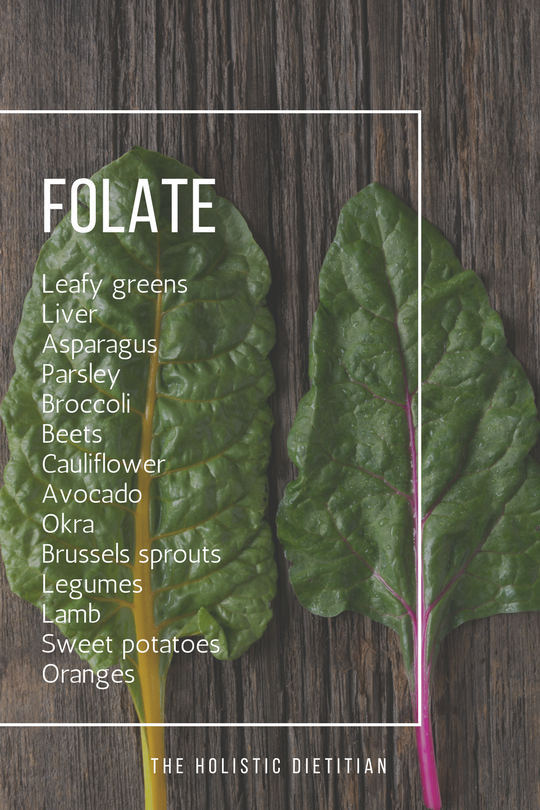Folic acid versus Folate in pregnancy

I sat on the couch crying in extreme pain as I was trying to nurse my newborn, who was also crying from frustration. I had years of experience supporting nursing moms and I knew pain was to be expected in the early days. But never in my wildest dreams had I expected it to be like this.
That’s when I popped out of my postpartum fog for a split second and thought to lift his little lip and check for a lip tie. Yup. There it was. It was a band that stretched from his upper lip down to the part that attaches to the gum. After confirmation from a local lactation consultant, he did indeed have both a lip and tongue tie.
Well, at least I had a reason for the extreme pain when breastfeeding. But WHY? As a dietitian, knew what to do. I took a food-derived prenatal, and had good nutrition prior to conception, and ate pretty well during pregnancy. That’s when in my research, I stumbled across the connection between folic acid, folate, and midline defects such as tongue and lip ties.
Folic acid and folate are often used interchangeably. But let’s take a deeper look and see what is the difference and implications behind them.
Folate & Folic Acid

Folate, or vitamin B9, is actually considered a group of water-soluble vitamins. This nutrient is especially important prior to conception and during the very early stages of pregnancy. Involved in DNA production and cell division, it is especially critical to the development of the nervous system and prevention of neural tube defect. (source)
Folic acid refers to the synthetic form not found in nature. It is also inexpensive and more stable, which is why it is added to our food supply and in to many supplements – including many prenatal supplements. (source)
Why is Folic Acid in Our Foods?
In 1996, the FDA mandated the fortification our foods with folic acid in attempt to decrease the prevalence of neural tube defects. (source) Enriched breads, cereals, flours, cornmeals, pastas, rice, and other grain products became main contributors of folic acid, especially in our grain-laden American diets. (source) While fortification did reduce the risk of neural tube defects, this synthetic form, folic acid, may be posing a threat to those with a variation in their MTHFR gene.

What the mother is MTHFR?!
MTHFR is an enzyme methylene-tetrahydrofolate reductase, which helps convert the folate you consume into the active form, 5-MTHF, or, 5-Methyltetrahydrofolate. (source) The MTHFR enzyme is actually the last step in this conversion. If you have a MTHFR polymorphism, which is often referred to as a MTHFR gene mutation, it is very likely that your ability to convert folate to the active forms will be affected. Additionally, we experience a loss of the enzyme in the liver needed to turn folic acid into folate for the body to use. Approximately 60% of us today have a compromised ability to convert folic acid to the active form. (source)
What this means
Folic acid can affect those who are unable to process it because it occupies the receptors on cells that need folate, meaning that the body will not be able to process any natural folate from the diet. Even more startling is that studies are revealing that chronic consumption of folic acid may actually be creating a deficiency, even in those with without the MTHFR gene mutation. (source)
With increased intake of folic acid – whether through fortified foods or folic acid supplements – only a small percentage is converted in to the useable form, resulting in unmetabolized folic acid in the blood. Research shows that synthetic folic acid can increase the risk of some cancers (source) and childhood asthma (source), may mask vitamin B12 deficiency (source), and also depress immune function (source). Meanwhile, possible conditions related to folate deficiency include neural tube defects, recurrent miscarriage, midline defects (heart murmur, oral palate, sacral dimple), neurological problems, anxiety, growth problems, thyroid problems, anemia, and more.
Mid-line Defects

So back to my story – while I was taking prenatal vitamins and eating a nutrient-dense diet, what I came to discover is that my lack of quality prenatal vitamin early in this unexpected pregnancy, topped with years of birth control pills which deplete folate, layered with a slight MTHFR mutation created the perfect storm. My body was unable to process the folic acid and folate my body was receiving into active form, resulting in the tongue and lip tie in my son. While it’s a blessing that it was only minor concern comparatively, it did almost crumble our nursing relationship in those early days.
This newfound understanding about the misconceptions in prenatal nutrition led me to furthering my education in functional nutrition, deepening my knowledge about the nutritional relationship of the health conditions that plagues our society.
What’s a Mom to do?
So maybe you’re reading this, pregnant, and you discover that you’re taking a prenatal that contains folic acid. Do not fret! Fear and stress should be avoided at all costs. I wrote this article to empower and inform you about nutrition in pregnancy and choosing quality supplements.
Keep in mind that while you may have a MTHFR gene mutation, your body’s ability to process folic acid depends on the state of your gut, your genetics, and even how genes are expressed. (read more on epigenetics)

Opt for folate. Choose the natural form of folate from food sources. Excellent sources include leafy greens, liver, asparagus, parsley, broccoli, beets, cauliflower, avocado, okra, Brussels sprouts, and legumes. It’s recommended to consume between 800 and 1200 mcg of folate per day before conception and 600-800 mcg per day during pregnancy.
When it comes to supplements, avoid any that contain folic acid. Be sure to check all your multivitamins, prenatals, and B complex vitamins as many supplements contain folic acid. Other good forms of folate include “5-methyltetrahydrofolate” or “5-MTHF,” however it’s important to speak to your health care team whether these forms are appropriate for you (and how much). Hypermethylation is possible and is associated with cancer, immune dysfunction, and other adverse effects. (source)
Grand takeaway: Avoid folic acid by avoiding supplements that contain it along with processed {fortified} foods. Eat a diet with plenty of variety and nutrient-dense foods to support optimal intake.
(my entire blog post summed up in under 30 words)
For more information about nutrition for your pregnancy, schedule a complimentary meet and greet session.
Be the first to comment